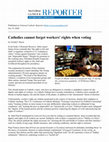Books by Gerald J. Beyer

Fordham University Press, 2021
The first chapter and table of contents of Just Universities can be read at the publisher's websi... more The first chapter and table of contents of Just Universities can be read at the publisher's website: https://www.fordhampress.com/9780823289967/just-universities/. Abstract:
Gerald J. Beyer’s Just Universities discusses ways that U.S. Catholic institutions of higher education have embodied or failed to embody Catholic social teaching in their campus policies and practices. Beyer argues that the corporatization of the university has infected U.S. higher education with hyper-individualistic models and practices that hinder the ability of Catholic institutions to create an environment imbued with bedrock values and principles of Catholic Social Teaching such as respect for human rights, solidarity, and justice. Beyer problematizes corporatized higher education and shows how it has adversely affected efforts at Catholic schools to promote worker justice on campus; equitable admissions; financial aid; retention policies; diversity and inclusion policies that treat people of color, women, and LGBTQ persons as full community members; just investment; and stewardship of resources and the environment. The fir
Lublin: Wydawnictwo KUL, 2018

University of Notre Dame Press, 2010
In Recovering Solidarity, Gerald J. Beyer provides a contextualized theological and ethical treat... more In Recovering Solidarity, Gerald J. Beyer provides a contextualized theological and ethical treatment of the idea of solidarity. He focuses particularly on the Polish Solidarity movement of the 1980s and the ways in which that movement originally embodied but, during the country’s transformation to a capitalist democratic society, soon abandoned this important aspect of the Catholic social tradition.
Using Poland as a case study, Beyer explores the obstacles to promoting an ethic of solidarity in contemporary capitalist societies and attempts to demonstrate how the moral revolution of the early Solidarity movement can be revived, both in its country of origin and around the world. Recovering Solidarity is widely interdisciplinary, utilizing Catholic social tradition, philosophical ethics, developmental economics, poverty research, gender studies, and sociology.
Papers by Gerald J. Beyer
Theological Studies, 2024
Pope Francis’s statement about NATO expansion provoking Russia to invade Ukraine raises the quest... more Pope Francis’s statement about NATO expansion provoking Russia to invade Ukraine raises the question about whether it is legitimate to support NATO generally and its expansion after 1989 in particular. This article argues that the right of nations to self-determination and legitimate defense and the ethic of solidarity as understood in the Catholic social tradition can justify NATO’s existence and enlargement. The author concludes that not only was NATO enlargement after 1989 justified, but it should also be open to Ukraine and other countries in the region in accordance with these tenets of Catholic social teaching.
Concilium: Revista internacional de Teologia, 2023
Muchas facultades y departamentos de teología pregonan su
compromiso de servir al bien común y a... more Muchas facultades y departamentos de teología pregonan su
compromiso de servir al bien común y abordar cuestiones acuciantes
como el racismo y la supremacía blanca, la destrucción del
medio ambiente, la injusticia económica y el fomento de comunidades
que respeten toda la diversidad y la gama de identidades de sus
miembros. Aunque encomiables y necesarios, estos esfuerzos por
promover el bien común y la justicia en la sociedad son hipócritas e
inútiles si los teólogos no intentan seriamente promover la justicia y
el bien común dentro de la propia academia. Dicho de otro modo, el
giro de la teología contemporánea hacia la praxis debe volverse hacia
dentro, hacia las propias casas institucionales de la teología.
Christine Firer Hinze, Michael Pirson and John Seitz, eds., Working Alternatives: Studies of Economic Experiment and the Human Person (New York: Fordham University Press), 2021
Political Theology Network , 2022
I am a Christian theologian who abhors war and believes that all other reasonable means should be... more I am a Christian theologian who abhors war and believes that all other reasonable means should be exhausted before the use of lethal force is undertaken. At the same time, I am convinced that there are times – albeit rare – when the evil is so great that no measure other than force will prevent grave atrocities on a massive scale. The effort to defeat Russia in Ukraine is such a case.
Political Theology Network , 2022
Upon completing the book, I wanted to turn my attention to my other scholarly interests. I wanted... more Upon completing the book, I wanted to turn my attention to my other scholarly interests. I wanted to look away. However, the book, despite whatever shortcomings it has, seems to have struck a chord. Reading groups have used it on several campuses. I have given more talks already since its 2021 publication than about any other topic over the course of my career.

American Journal of Economics and Sociology, 2021
The highly anticipated publication of Karol Wojtyła’s Katolicka etyka społeczna (KES) in 2018 pro... more The highly anticipated publication of Karol Wojtyła’s Katolicka etyka społeczna (KES) in 2018 provides a novel and important basis for understanding the economic thinking of Pope John Paul II. The text is comprised of Wojtyła’s extensive lecture notes from the 1950s on the topic of Catholic social teaching and spans almost 500 pages. KES illustrates the future pope’s deep concern for economic justice as a young priest and his ambivalence towards capitalism, which persisted throughout his papacy. Given the size of KES, this article selectively focuses on Wojtyła’s treatment of topics of continuing relevance: the right of the Church to pronounce on economic matters; private property and the “social mortgage” on it; inequality, the just distribution of resources, and the “option for the poor”; the moral assessment of capitalism and Marxism; the dignity of labor and workers’ rights; and the role of conflict in promoting the common good. I contend that KES is consonant with the later papal teaching of John Paul II on economic justice and that it provides a hermeneutic key to understanding it. Furthermore, I argue that the “radicalism” of Karol Wojtyła on matters of economic justice in KES coheres with papal social teaching from Pope Paul VI through that of Pope Francis.
The Notre Dame Journal of Law, Ethics and Public Policy, 2007
thanks are due to the participants who made a number of helpful comments and stimulated further t... more thanks are due to the participants who made a number of helpful comments and stimulated further thought on the concerns of this essay.

National Catholic Reporter, 2020
In his book A Shameful Business, labor expert James Gross contends that "the right to life and li... more In his book A Shameful Business, labor expert James Gross contends that "the right to life and limb" is regularly violated in U.S. workplaces, where "crimes against humanity" turn workers into "disposable things." Despite his promises to the working class, President Donald Trump has assaulted workers' rights to life, limb and livelihood throughout his presidency. The nonpartisan Economic Policy Institute recently produced a report detailing "the Trump administration's 50 most egregious attacks on working people." The head of the BlueGreen Alliance, a coalition of environmental groups and labor unions, deemed Trump "the most antiworker and anti-environment president of our lifetime." This should matter to Catholic voters, who have an obligation to consider a candidate's respect for the dignity and rights of workers. As Catholic bishops have recently reminded us, Catholics must consider all threats to human dignity, life and the future of the planet, in addition to the "preeminent" threat of abortion. Unfortunately, workers' rights are seldom mentioned in the context of elections, despite their emphasis in Catholic teaching. The U.S. Conference of Catholic Bishops' "Forming Consciences for Faithful Citizenship" states "treating workers as mere means to an end, deliberately subjecting workers to subhuman living conditions" and "treating the poor as disposable" are "intrinsically evil acts." Political leaders must safeguard the "dignity of the human person and the common good by respecting the dignity of work and protecting the rights of workers." St. John Paul II maintained in Laborem Exercens that by toiling as a manual laborer, Jesus revealed that the dignity and rights of all workers are sacred. Solidarity with workers is required to prove "fidelity to Christ." Thus, the church defends the rights necessary for "ensuring the life and health of workers and their families," such as a family living wage, health insurance, safe working conditions, and the right to unionize. Pope Francis insists that all lives are sacred (Gaudete et Exsultate) and must be defended, including those "at the mercy of economic interests or indiscriminate exploitation" (Evangelii Gaudium). In his words, an economy that idolizes profits rather than prioritizing "dignified work" for all constitutes a form of "hidden euthanasia." Moreover, exploiting workers is a "mortal sin"
Nicholas P. Cafardi, ed., Voting and Faithfulness: Catholic Perspectives on Politics, 2020
Copyright prevents me from posting the entire article here. It is published in Nicholas P. Cafar... more Copyright prevents me from posting the entire article here. It is published in Nicholas P. Cafardi, ed., Voting and Faithfulness: Catholic Perspectives on Politics (Mahwah, NJ: Paulist Press, 2020), 153-178.
Catholic Theological Ethics in the World Church Forum, 2020
Together for the Common Good Leading Thinkers, 2020
In a pandemic solidarity requires us to be apart.
Political Theology Today, 2017
America: The Jesuit Review of Faith and Culture, 2017

Journal of Religious Ethics, 2017
Catholic moral theology possesses a number of tools that can be employed to promote worker justic... more Catholic moral theology possesses a number of tools that can be employed to promote worker justice. Some of these tools, such as Catholic social teaching on solidarity and workers’ rights, have been used to this end before. However, advocates of workers’ rights have seldom utilized other concepts, such as cooperation in evil, scandal, and evangelization. This essay provides a theoretical introduction to several tools in the “toolkit” of Catholic ethicists, engaging contemporary scholarship on them. It then applies the concepts to two cases in order to demonstrate their usefulness in the struggle for worker justice. Both cases involve Catholic universities, which means the ethical concepts introduced from the Catholic moral tradition should have normative status for these institutions. The first case entails a divestment campaign at the University of Notre Dame. The second case confronts the unjust treatment of adjunct faculty members at Catholic colleges and universities.
Religion Dispatches, 2017










Uploads
Books by Gerald J. Beyer
Gerald J. Beyer’s Just Universities discusses ways that U.S. Catholic institutions of higher education have embodied or failed to embody Catholic social teaching in their campus policies and practices. Beyer argues that the corporatization of the university has infected U.S. higher education with hyper-individualistic models and practices that hinder the ability of Catholic institutions to create an environment imbued with bedrock values and principles of Catholic Social Teaching such as respect for human rights, solidarity, and justice. Beyer problematizes corporatized higher education and shows how it has adversely affected efforts at Catholic schools to promote worker justice on campus; equitable admissions; financial aid; retention policies; diversity and inclusion policies that treat people of color, women, and LGBTQ persons as full community members; just investment; and stewardship of resources and the environment. The fir
Using Poland as a case study, Beyer explores the obstacles to promoting an ethic of solidarity in contemporary capitalist societies and attempts to demonstrate how the moral revolution of the early Solidarity movement can be revived, both in its country of origin and around the world. Recovering Solidarity is widely interdisciplinary, utilizing Catholic social tradition, philosophical ethics, developmental economics, poverty research, gender studies, and sociology.
Papers by Gerald J. Beyer
compromiso de servir al bien común y abordar cuestiones acuciantes
como el racismo y la supremacía blanca, la destrucción del
medio ambiente, la injusticia económica y el fomento de comunidades
que respeten toda la diversidad y la gama de identidades de sus
miembros. Aunque encomiables y necesarios, estos esfuerzos por
promover el bien común y la justicia en la sociedad son hipócritas e
inútiles si los teólogos no intentan seriamente promover la justicia y
el bien común dentro de la propia academia. Dicho de otro modo, el
giro de la teología contemporánea hacia la praxis debe volverse hacia
dentro, hacia las propias casas institucionales de la teología.
Gerald J. Beyer’s Just Universities discusses ways that U.S. Catholic institutions of higher education have embodied or failed to embody Catholic social teaching in their campus policies and practices. Beyer argues that the corporatization of the university has infected U.S. higher education with hyper-individualistic models and practices that hinder the ability of Catholic institutions to create an environment imbued with bedrock values and principles of Catholic Social Teaching such as respect for human rights, solidarity, and justice. Beyer problematizes corporatized higher education and shows how it has adversely affected efforts at Catholic schools to promote worker justice on campus; equitable admissions; financial aid; retention policies; diversity and inclusion policies that treat people of color, women, and LGBTQ persons as full community members; just investment; and stewardship of resources and the environment. The fir
Using Poland as a case study, Beyer explores the obstacles to promoting an ethic of solidarity in contemporary capitalist societies and attempts to demonstrate how the moral revolution of the early Solidarity movement can be revived, both in its country of origin and around the world. Recovering Solidarity is widely interdisciplinary, utilizing Catholic social tradition, philosophical ethics, developmental economics, poverty research, gender studies, and sociology.
compromiso de servir al bien común y abordar cuestiones acuciantes
como el racismo y la supremacía blanca, la destrucción del
medio ambiente, la injusticia económica y el fomento de comunidades
que respeten toda la diversidad y la gama de identidades de sus
miembros. Aunque encomiables y necesarios, estos esfuerzos por
promover el bien común y la justicia en la sociedad son hipócritas e
inútiles si los teólogos no intentan seriamente promover la justicia y
el bien común dentro de la propia academia. Dicho de otro modo, el
giro de la teología contemporánea hacia la praxis debe volverse hacia
dentro, hacia las propias casas institucionales de la teología.
Panelists include Dr. Donna Haverty Stacke of Hunter College, Dr. Mary-Antoinette Smith of Seattle U., President Patricia McGuire of Trinity University, and Lily Ryan of the Kalmanovitz Initiative for Labor and the Working Poor at Georgetown U.